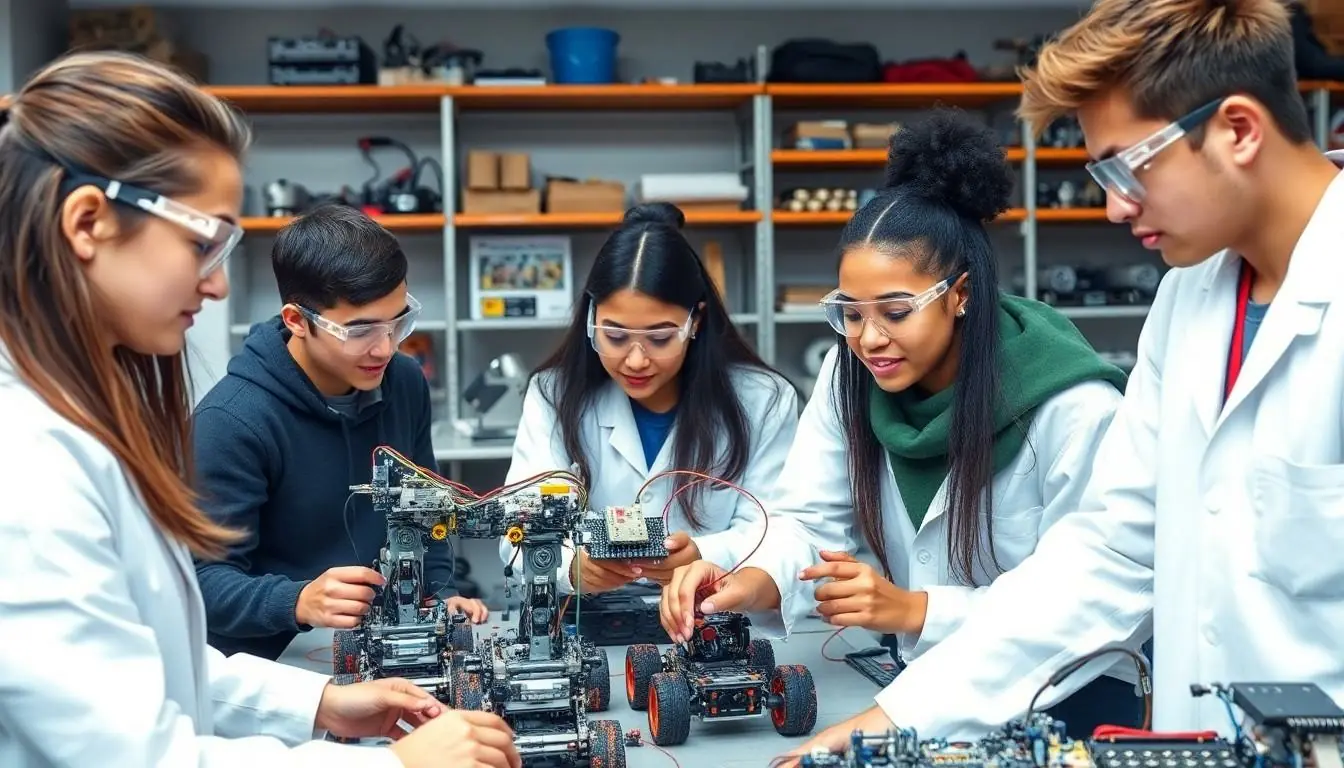Table of Contents
ToggleIn a world where robots are no longer just a figment of sci-fi imagination, pursuing a robotics major can feel like stepping into the future. Imagine designing machines that could help with everything from mundane chores to life-saving surgeries. It’s like being a wizard, but instead of casting spells, you’re programming algorithms.
With technology evolving faster than a caffeinated squirrel, a degree in robotics opens doors to exciting careers. Whether it’s creating autonomous vehicles or developing smart home devices, the possibilities are endless. Plus, who wouldn’t want to tell their friends they’re studying how to build the next generation of R2-D2? Embrace the challenge and dive into a field that’s not just about wires and circuits, but about shaping the world of tomorrow.
Overview Of Robotics Major
A robotics major encompasses the study of designing, building, and programming robots. Students explore interdisciplinary fields, including mechanical engineering, electrical engineering, and computer science. Courses involve hands-on projects and theoretical knowledge, allowing students to apply principles to real-world problems.
In robotics programs, students learn about automation, artificial intelligence, and machine learning. Skills in coding play a significant role, as programming languages like Python and C++ are essential for robot functionality. Students also concentrate on sensors and control systems, enhancing robots’ ability to interact with their environment.
Internship opportunities are vital in this field, allowing students to gain experience with industry leaders. Practical experience supports classroom learning, providing insights on current technologies and trends. Networking helps students forge connections that can facilitate job placements upon graduation.
Career options available to robotics graduates include positions in various sectors, such as manufacturing, healthcare, and aerospace. Designing autonomous vehicles or developing surgical robots offers pathways for innovation. Robotics majors can also contribute to research, working alongside scientists to advance technology.
Graduates are equipped to tackle challenges associated with robotic applications. Problem-solving skills developed in academic programs prepare them for real-world obstacles. As technology evolves, the demand for skilled professionals in robotics continues to grow, creating numerous career prospects.
Core Subjects In Robotics Major

Robotics majors study various subjects that enable them to design and develop advanced technologies. These core subjects provide essential knowledge and skills needed in this dynamic field.
Mechanical Engineering Foundations
Mechanical engineering principles serve as the backbone of robotics. Students learn about dynamics, material properties, and thermodynamics, applying these concepts to create robot designs. Understanding kinematics is crucial for movement analysis in robots. Machine design courses cover the creation of efficient mechanical systems. Fabrication skills enhance hands-on abilities, allowing students to construct physical prototypes.
Electrical Engineering Fundamentals
Electrical engineering is pivotal in robotics education. Coursework encompasses circuit analysis, control systems, and sensor technology. Students explore topics like embedded systems, enabling them to integrate hardware and software effectively. Learning about power electronics aids in understanding energy management in robotic systems. Students also engage with robotics-specific electrical components, which is vital for system functionality and performance.
Computer Science Integrations
Computer science plays a significant role in robotics. Knowledge in programming languages such as Python and C++ is fundamental for coding robots. Algorithms for machine learning and artificial intelligence enhance a robot’s decision-making abilities. Software development processes provide insights into project management and application deployment. Students often tackle challenges related to data processing and system optimization, equipping them with crucial computational skills for future careers.
Career Opportunities For Robotics Graduates
Robotics graduates can explore a variety of career paths across numerous industry sectors. As technology advances, opportunities continue to expand, making this field highly promising.
Industry Sectors Hiring Robotics Majors
Manufacturing companies seek robotics experts to optimize automation processes. Healthcare institutions employ graduates to design surgical robots that enhance precision during procedures. Aerospace firms leverage robotics specialists for developing drones and autonomous aircraft systems. Many graduates also find roles in research institutions and academic settings, focusing on innovation and project-based initiatives. Companies in consumer electronics look for talent to create smart home devices, integrating robotics with daily life.
Job Roles And Responsibilities
Robotics engineers hold vital positions, designing and testing robotic systems. Programmers within the field are tasked with writing software that drives robotic functionality. Technicians ensure machines run smoothly, addressing maintenance and repair needs. Project managers oversee robotics initiatives, coordinating teams and resources to meet project goals. Researchers focus on machine learning algorithms and artificial intelligence, pushing boundaries in robotic capabilities. Each role contributes to advancing technology and enhancing productivity across various sectors.
Skills Required For Success In Robotics
Robotics demands a blend of various skills for students to excel in the field. Technical proficiency in coding languages like Python and C++ forms the foundation of programming robots effectively. Understanding mechanical engineering principles is crucial; knowledge of dynamics and material properties enables students to design robust robotic systems.
Moreover, familiarity with electrical engineering promotes expertise in circuit analysis and control systems, allowing seamless integration of hardware and software. Students benefit from hands-on experience, which enhances fabrication skills and facilitates practical application of theoretical concepts.
Soft skills play an equally important role. Problem-solving abilities enable graduates to tackle complex challenges that may arise during a project. Teamwork skills enhance collaboration with peers, as many robotics projects are interdisciplinary, requiring input from multiple fields.
Critical thinking is essential; it helps students analyze various scenarios and make informed decisions when designing robots. Innovation fosters creative solutions, setting graduates apart in a competitive job market. Communication skills also remain vital, as articulating technical concepts clearly to non-technical stakeholders ensures successful project collaboration.
Additionally, adaptability is fundamental in the rapidly evolving tech landscape of robotics. Students must stay updated on emerging trends and technologies to remain relevant in the field. Fostering a continuous learning mindset equips graduates with the tools to succeed in various roles, from robotics engineers to researchers.
A strong technical foundation combined with vital soft skills positions students favorably for a successful career in robotics. Engaging in internships and practical projects provides further opportunities to refine these skills and gain industry insights.
Challenges In The Robotics Field
Facing numerous challenges, the robotics field demands innovative solutions. One significant hurdle involves the complexity of designing robots that meet human needs. Engineers encounter difficulties in creating robots that can effectively interact with their environment while ensuring safety and functionality.
Integration of various systems poses another challenge. Robotics projects often require combining mechanical components, electrical systems, and software algorithms. Aligning these distinct elements demands meticulous attention to detail and strong interdisciplinary collaboration.
Technological advancement continually pushes boundaries, making it essential for professionals to stay updated. Rapid changes in artificial intelligence, machine learning, and sensor technology necessitate ongoing education and training for students and workers alike. Adaptability in skills is crucial, as outdated knowledge can hinder progress.
Funding and resource allocation also complicate the robotics landscape. Securing financial support for research and development activities proves challenging, particularly for startups and academic projects. Limited budgets can restrict access to advanced technology and equipment, impacting innovation.
Ethical considerations add another layer of complexity to robotics. Developing autonomous systems raises questions about safety, decision-making, and moral responsibility. Addressing these issues is essential to gain public trust and ensure responsible deployment of robotic systems.
Lastly, competition in the job market intensifies as more individuals pursue robotics careers. Graduates with relevant experience, such as internships and hands-on projects, hold a competitive edge. Distinguishing oneself through specialized knowledge, such as advanced programming or specific engineering principles, enhances job prospects in this evolving field.
The field of robotics offers a wealth of opportunities for those ready to embrace its challenges. With technology advancing at an unprecedented pace, graduates are positioned to make significant contributions across various industries. The blend of technical expertise and soft skills prepares them to tackle real-world problems and drive innovation.
As they navigate their careers, staying updated on emerging trends in artificial intelligence and machine learning will be crucial. The demand for skilled professionals in robotics is set to grow, making this an exciting time to enter the field. For aspiring students, pursuing a robotics major can lead to a fulfilling and impactful career that shapes the future of technology.




